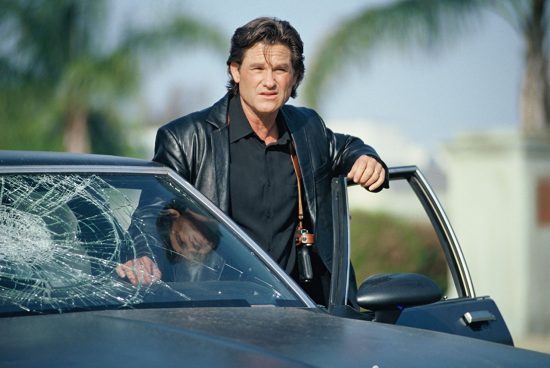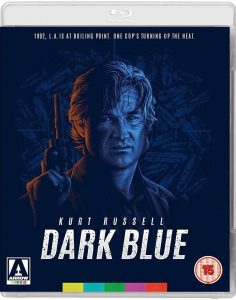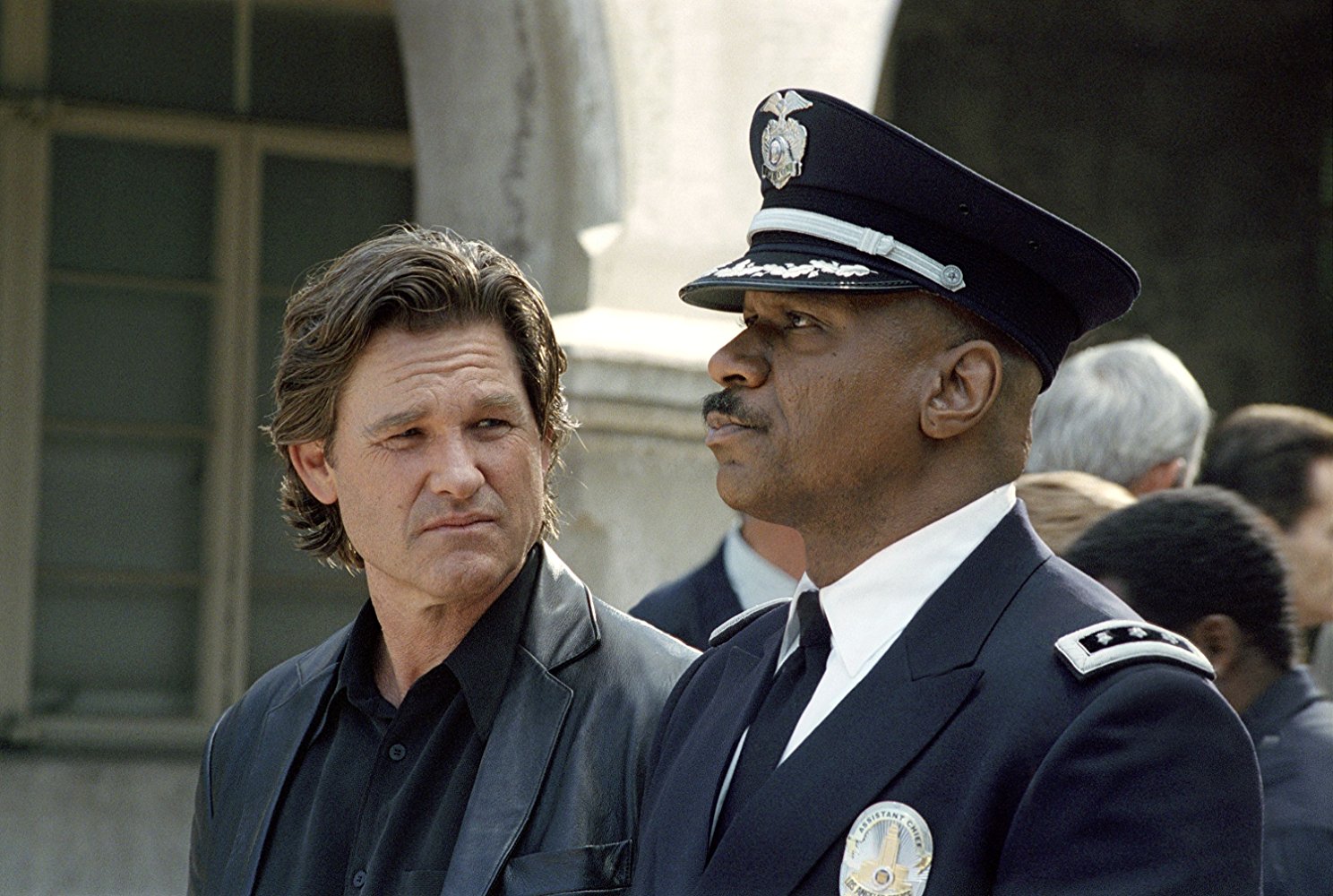 For many of us, Kurt Russell will always be associated first and foremost with his run of cult classics in cahoots with director John Carpenter. Even so, in 2018 he remains an equally familiar face for contemporary audiences thanks to his high profile roles in Guardians of the Galaxy Vol 2, the last two Fast & Furious movies, and his collaborations with Quentin Tarantino (of which there’s another on the way, as Russell was recently reported to be in talks for Tarantino’s upcoming Once Upon A Time In Hollywood). However, Russell – truly a lifelong professional, having started out as a child actor in the 60s, with almost 100 screen credits to his name – has done a slew of other largely overlooked roles in the interim between his 80s/90s heyday and his recent elder statesman resurgence. Some of these, admittedly, might be best forgotten (i.e. Soldier), but some of them might be well worth dusting off and giving another chance – and 2002’s Dark Blue definitely ranks among the latter.
For many of us, Kurt Russell will always be associated first and foremost with his run of cult classics in cahoots with director John Carpenter. Even so, in 2018 he remains an equally familiar face for contemporary audiences thanks to his high profile roles in Guardians of the Galaxy Vol 2, the last two Fast & Furious movies, and his collaborations with Quentin Tarantino (of which there’s another on the way, as Russell was recently reported to be in talks for Tarantino’s upcoming Once Upon A Time In Hollywood). However, Russell – truly a lifelong professional, having started out as a child actor in the 60s, with almost 100 screen credits to his name – has done a slew of other largely overlooked roles in the interim between his 80s/90s heyday and his recent elder statesman resurgence. Some of these, admittedly, might be best forgotten (i.e. Soldier), but some of them might be well worth dusting off and giving another chance – and 2002’s Dark Blue definitely ranks among the latter.
At a glance, Dark Blue looks to be a fairly standard cop thriller. Russell is Eldon Perry, a seasoned LAPD detective partnered with fresh-faced youngster Bobby Keough (Scott Speedman), and as we meet the pair of them they’re facing a review board over the fatal shooting of a suspect. While the board ultimately rules in their favour, the vote is not unanimous, with deputy chief Arthur Holland (Ving Rhames) believing the duo have distorted the truth and acted with unnecessary force. The audience soon learns that Holland is entirely correct, and that Perry – under command of reigning LAPD chief, Jack Van Meter (Brendan Gleeson) – has been using unnecessary force and distorting the truth for his entire career, and is now initiating an uneasy Keough into that same school of law enforcement. Soon enough, Perry and Keough are on the case investigating what seems to be a motiveless massacre in a convenience store, and the case will serve to push their already fragile partnership to breaking point in an increasingly pressured environment. Oh, and one key reason for that pressure: their investigation kicks off in late April 1992, in the last days of the Rodney King trial, whose verdict resulted in the infamous LA riots.

As longtime readers of this site will be well aware, we’ve long been big fans of Arrow Video thanks to their sterling treatment of old cult favourites, primarily genre-based. Given their history, Dark Blue does initially seem an odd choice for the label, as it’s a comparatively recent film, and hasn’t necessarily developed much of a cult reputation since it flew under the radar on release in early 2003. Still, the film serves as an interesting indicator of where the cop thriller format stood at the time. In the immediate aftermath of 9/11, the gun-crazy action that dominated the 80s and 90s no longer seemed particularly tasteful, and as such movies based around the police or the military opted for a more grounded approach with deeper political and psychological nuances. Russell’s Eldon Perry is a fine representation of this brief era of (if you’ll pardon the expression) post-action heroes, as on the one hand he’s everything we expect a movie cop to be – tough, tenacious, street-smart, and inclined to bend or break the rules – but on the other hand, he’s a flagrantly bigoted, racist, alcoholic thug who cares more about his own pride than the rule of law. This makes for an interesting contrast with Scott Speedman’s much younger, more sheepish detective. Let’s face it, the fact that Speedman’s in it is the key thing that marks out Dark Blue as a film of the early 2000s, but on this evidence it’s apparent that the Underworld actor may have been capable of more, and it seems a shame that his career dried up. Then there’s solid support from Brendan Gleeson as the tyrannical police chief, and an unusually low key turn from Ving Rhames as the principled cop anxious to expose the corruption.
Still, all things considered it wouldn’t be fair to declare Dark Blue some kind of forgotten masterpiece. Director Ron Shelton (Bull Durham, White Men Can’t Jump) isn’t necessarily known for pushing the envelope dramatically or aesthetically, and his work here is no exception. The balance between traditional cop thriller and socially conscious drama is uneasy, and while the Rodney King trial is never anything more than a background element, we might be forgiven for doubting whether the film would pack much punch at all without it. Perhaps even more notably, the central dynamic of dirty older cop and more principled younger cop is immediately evocative of a more prominent early 2000s cop thriller, Training Day: small wonder, given that the script for Dark Blue is from the same screenwriter, David Ayer (working here from a story by James Ellroy). Even so, this is definitely a film that fans of Kurt Russell will want to see, even if just the once, as it has to rank among his most complex and sophisticated performances.
On top of being an unusual choice for Arrow Video, it’s also an unusually bare-bones release from the label; the extras are all reproduced from the original DVD release with no new material.
Dark Blue is available on Blu-ray now from Arrow Video.
